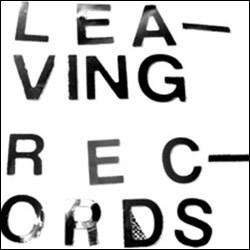
Probably the biggest surprise of a year when the cassette went from fetish to something worth digging for. By the time you start hearing about Dem Hunger, a garish fantasy of found noise, bent-arc samples, and basement beats, or Sumsun, a stunning boombox-ready flaying of chillwave, you’ll be scrambling for these tapes and they’ll be gone. At least go discover Speculator’s brilliant Lifestyle, an album so fresh you’d think it’s broadcast live from some pop dungeon three doors down.

Idle Times
Hozac
Though Brian Standeford, as leader of Seattle’s Idle Times, has crafted a few singles worthy of mention, it often felt like he was buzzing up a cloud of static and feedback to mask what were essentially standard psych nuggets accented by a sick splatter of guitar flaying. It was rough and wicked, but non-essential. Enter Idle Times’ first full-length, a record so blown-out that the lean towards crippled ghettoblaster recordings is nearly unforgivable. But even at the point when the epic “Hey Little Girl” (four minutes is epic for Standeford) becomes a mix muddy enough to run the song from its track and lose all semblance of tune and melody, the knob-tweaking reveals a satisfyingly ecstatic collection of songs.

Welcome Home/Diggin’ the Universe: A Woodsist Compilation
Woodsist
It was difficult to pick a favorite Woodsist record to add to this list. Feeling like the founders of Woodsist, Woods had the most under-heard album of them all. This is the logical solution. The compilation plays like a great mixtape, filled with exclusive gems and new found treasure. It was the perfect summer companion.
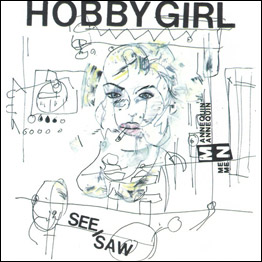
“Hobby Girl”
Hozac
Full disclosure: I had to set aside a shelf for all the Hozac records I’ve procured over the last year. Of all the great singles and records the label released, mathematically this is the record I listened to the most. From what I’ve heard, “Hobby Girl” is not representative of what Chicago’s Mannequin Men do on the reg. None of that matters. What matters is “Hobby Girl” is the catchiest song I’ve heard all year. It’s reminiscent of youth and good times, riding in a car, hanging out.

Han Dynasty
De Stijl
At first the mystery surrounding the music of London’s Hype Williams is more intriguing than what lies in the grooves: two sides of muddled collage, randomly generated tones and moans, a player piano waterlogged and stuck on the same measure, and basslines repeated and looking for a cliff from which to jump. Whether or not you believe the “hype” and “legend” of how this record was made (it’s a farce, by the way), there’s truly some murky energies underneath it all. The cut-and-paste nature of this 7-inch is what is truly fascinating.
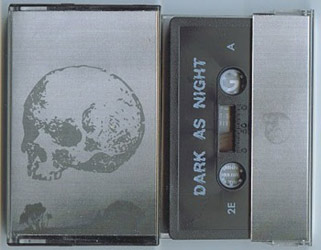
Dark As Night
Bathetic
This extremely limited cassette (though readily available digitally) is your one-stop shop for what is known as witch-house, or goth-wave, or haunted house. You’re either on the nightbus or you’re off. Of course, a lot of this imagined genre is disastrously pretentious and simple to conceive, but the bands represented here—despite goofy names like oOoOO and those which involve using your computer’s symbol map—come across as pioneers. Of everything I’ve heard, and quickly tossed off, these songs are nuanced and hypnotic, taking the parameters they’ve set for themselves—screwed and chopped synths, sub-bass beats, spooky vocals—and making something quite atmosphere-altering.
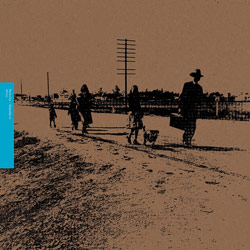
Sleepwalker ep
Sacred Bones
With no gimmicks or frills, there’s a sense that Richmond’s Jason Boyer is oblivious to the indirect influences with which you could compare this. Instead, just when you start to pick his loner folk-punk apart, the thought evaporates in his aural ether. These are recordings played without the knowledge that the tape is rolling—straight from the misery tank and beautiful all the same.

When this label introduced Lambsbread to the world, they were simply just another noise imprint, with hyper-limited releases and barely a face. It’s nice that over the years they’ve evolved, much like the Not Not Fun catalogue, into a hub that welcomes and promotes every new direction psychedelic music is headed. From the ominous, sadness-dub of Forest Swords to the Ariel Pink orphanage that is Outer Limits Recordings, every release exudes a hint of the grotesque, even when playing it straight. Telling is that Olde English is also the current bugle for hypnagogic kingpin, and ex-Skater, James Ferraro.
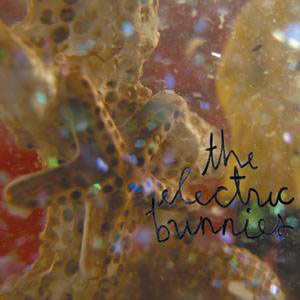
“Heal Me With Your Kiss”
Columbus Discount
Now past drinking age, you can hear the Electric Bunnies growing in these songs. “Heal Me With Your Kiss” is relaxed, mellow sunrise pop, roaming out of the cave and searching for lazy handclaps and well placed ooh-ed bubblegum harmonies. It’s a song so stripped of pretension and retro-leanings, so patient and pristine, if I had to name the best bands going in America right now, the Bunnies would be on a very short list. Flip it and “All the Pretty Girls Have Gone to the Beach,” is “Good Vibrations” on cough syrup, anchored in an after-hours beatbox. Maybe they’re mocking their own cuteness with such cool ugliness contained within a perfectly hummable song, but whatever the case, it works when it shouldn’t. As hard as the Bunnies are to pin down, this record shows their first love lies in popcraft.

Completely Dusted
Columbus Discount
You might think Deathly Fighter’s bubbling, meditative dub might not fit alongside a roster of boozy punk and out-folk, but under the grooves of Completely Dusted the unpredictable spirit of the Columbus aesthetic can be heard, only here manifested in Wu-Tang rhythms, Tangerine Dreams, and anonymous desolation. It’s an intriguing enigma of a record, not just because its sound is an anomaly in central Ohio, but also because Deathly Fighter feed their influence from a cultural smorgasbord.

American Haircut
Florida’s Dying
Bleak and buzzing, Dead Luke makes Wisconsin sound like the black hole of the Midwest. I’ve theorized that there are direct inferences to the Hospitals’ masterpiece, Hairdryer Peace, embedded here, and I’m still under that impression, especially here in the tundra of December. The dead of winter is where Dead Luke, siphoning “loner folk and acid trips” and cutting synths almost entirely out of the diet, fits perfectly.

Jungle/Surf
Underwater Peoples
There’s a lot of Animal Collective-aping in the underground these days, particularly from the youngest in those bunches. Pill Wonder kind of revel in playing monkey, basing most of their music in tribal cuckoo, but still coming up inventive and infectious. Underwater Peoples have built a cottage industry on breezy, suburban, lite-psych (Poco in Brooklyn), but Pill Wonder are the farthest from that label’s influential pole. They are all over the map and elusively off the grid.

That We Can Play ep
Hippos in Tanks
Get ready, I have a feeling Games are about to take over the soundsystem with their next-level, looped ’n’ neon, hypnoses. “Strawberry Skies” spins like the holy grail of early-80s synth-pop, while “Shadows in Bloom” is a drowsy, blown-out vision into the future. And every remix I hear by this duo slows life down to a vivid burst of melody and beat.

Acid Tape
Fan Death
Matt Whitehurst didn’t give us much to chew on this year. It’s a shame since everything heard in secret regarding the future of Psychedelic Horseshit might blow your mind, or at least melt your face. As it should be. The Acid Tape is made for cassette. It’s dubbed-out and gross pop, a motley blotter session captured to remind everyone of Whitehurst’s potential both in and out of control.
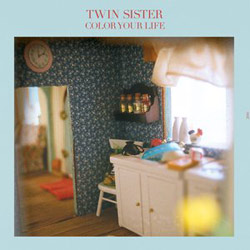
Color Your Life
Infinite Best
While Twin Sister’s star is rising as fast as the blogosphere can shove it to the sky, this album is perhaps a bit twee for this list. But at one moment earlier this year, Color Your Life landed inconspicuously onto the turntable, and to me it just sounded like the first wave of basement bands attempting to make music a grand, epicurean experience again. Hopefully they stick with that mood into their bright 2011, as well as continue mining Fleetwood Mac with different excesses, Radiohead sans the arena, and Björk roaming Long Island, like they do on this debut record. “All Around and Way We Go” is heaven.
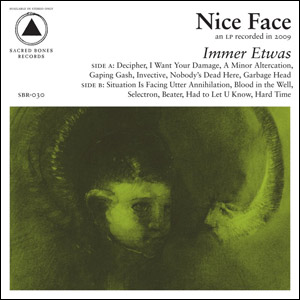
Immer Etwas
Sacred Bones
The one-man bedroom antics of Ian Magee could have easily seeped into obscurity after a handful of singles that seemed to get lost in the shuffle of blankdoggin’ hobos like Gary War, Pink Noise, and a dozen or so more. Normally, Magee’ forte is quick hits of synth-punk dementia submerged and distorted into a paranoia blitz that couldn’t possibly be tolerated 12 more times. The contrary seems true on Immer Etwas. It’s fitting that the title translates to “always something” because the record constantly slinks, stabs and shifts going for the throat like an all-night party that continually devolves, though you never want it to end. Coming out of the insular, sci-fi closet that may have thwarted Nice Face’s evolution, Immer Etwas quickly launches Magee into a space that is equal to—if not completely eclipsing—his contemporaries.

Bruise Constellation
Siltbreeze
Yeah, yeah, yeah... these Aussies love Royal Trux, right down to ripping off the heroin-chic couple on the teeter aesthetics. But when was the last time you heard Neil and Jennifer this heavy? An epiphany will be had once you see a five-headed, live manifestation of Bruise Constellation. It absolutely rips, like Black Sabbath doing Cats and Dogs—slow, chugging and deliberately sleazy. A show (were you lucky enough to stumble into one here in the US) completely full of arm-raising, beer-spilling anthems with a guitarist in Angie Bermuda that makes Haggerty look like a blooze chump.

Hell to Play
Meds
Listening to the Whines’ mighty debut, Hell to Play, you can hear a rare spirit that doesn’t usually permeate even the best of the lo-fi contingent passing as passing these days. You can hear anthem-driven streaks left over when wiping free the grime of the post-grunge hangover. You can hear the band obsessing over Guided By Voices lore even as it’s losing its oral history. You can follow them as they start backtracking over the International Pop Underground 7-inches. You can even smell the rite-of-passage. As opposed to most bedroom recordings traipsing over influence with scant respect, Hell to Play feels completely whole in vision and execution. It’s a goldmine for this type of discombobulated nostalgia.

This Austrian label is the luxury line for those with discriminating tastes—the drone obsessed, the synth elites, the retro-futurists and the electronic alchemists of the world all gather here. The non-funded independent (a diamond upgrade of the old Mego) houses Emeralds and that band’s various spin-offs, the transcendent lazer-cut bliss of Oneohtrix Point Never, Kevin Drumm, and a host of other modern composers. Though they make very few moves, each one feels special, not to mention, every package is immaculate. One could state a case for Editions Mego for their reissue of Fennesz’s Endless Summer alone.
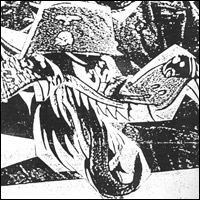
$$kum of the Earth
Columbus Discount
It’s quite essential to search wherever you can to procure a copy of perhaps the most brutal record in Columbus’ rich musical history since Photograph Burns (and that’s saying something). Chris Lutzko and company bear little resemblance to V-3, but their downer speedball of carnal noise and pigfuck riffs is just as much high art as it is terrorist punk, as psychedelic as it is sonically unbearable. Like a Cheater Slicks masterpiece in designer jeans and a cabal of pussy.
—Kevin J. Elliott
